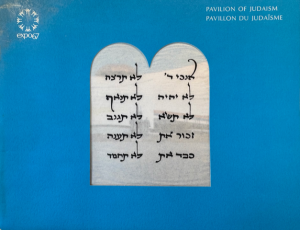One of Carol Ann Davidson’s most vivid memories of growing up on Cape Breton was singing in Sydney’s Temple Sons of Israel choir with the musical Dubinsky family. Half the choir was made up of Dubinskys, who encouraged their extended family to attend synagogue and to sing. Dubinsky scion, Leon, became a prominent recording artist who worked with the Rankin Family and Rita McNeil.
“Their voices were beautiful,” recalled Davidson. “It was special to sing in the choir.”
The temple’s revered rabbi, Israel Kenner, an opera lover, started the choir. “He was a major inspiration for the Jewish community,” she said.
Nova Scotia’s Cape Breton Island was home to a thriving Jewish community of some 400 families in the 1940s and ’50s, who met for services at the temple in Sydney and at synagogues in Glace Bay, New Waterford and Whitney Pier, one of Sydney’s oldest neighbourhoods. Davidson attended the last bar mitzvah held at the 109-year-old Glace Bay synagogue, Congregation Sons of Israel, before it closed in 2010.
At the bar mitzvah, Davidson, a Toronto broadcast journalist and travel writer, videotaped several interviews with mostly former Cape Breton Islanders, who reminisced about their lives on the island and spoke about the history of the Jewish community there.
Davidson said she realized the community was dwindling and that the time was right to make a documentary. Some 70 Jews currently live on Cape Breton and the one surviving synagogue, Temple Sons of Israel, established in 1919, has only 47 congregants.
Davidson got the ear of a CBC Radio producer, Steve Wadhams, who helped her create a radio documentary with her material. Davidson’s 20-minute documentary, The Last Synagogue of Cape Breton, which aired on CBC radio recently, can be heard on the CBC Radio website.
Cape Breton’s Jews were mainly of Russian origin. Davidson’s paternal grandparents, escaping persecution in Russian, were the first recorded Jewish settlers on Cape Breton in the late 1880s.
In the documentary, Gertrude Shane speaks about her parents, who immigrated to Canada from Russia, settling in New Waterford in 1921. “My father was in the army at the time of the Russian Revolution. And after the Russian Revolution, the Bolsheviks took over and it was dangerous for my father to stay,” she said.
Shane’s family chose Canada as their destination, since the United States, “afraid of Bolsheviks,” she recalled, had closed its doors.
Shane added that it wasn’t easy for an immigrant to get into Canada at the time, particularly if you were Jewish. “For Jews, it was even more difficult because there was prejudice against them.”
Some of the Jewish immigrants started working in the coal mines of Cape Breton, but like Shane’s father, they soon became pedlars and then merchants. While conducting interviews, Davidson was surprised to learn that one of the first languages some Jewish Cape Bretoners learned was Gaelic, the language their customers spoke.
The people Davidson interviews in the documentary say they rarely experienced anti-Semitism on Cape Breton “We always felt very well integrated,” Davidson said, adding that the diverse community was made up of people who accepted one another’s differences.
One glaring incident, however, was the anti-Semitism experienced by Davidson’s father, Harold, a surgeon who wanted to join the golf club in Sydney after the war in the 1940s. The club didn’t admit Jews, so her dad founded the Seaview Golf and Country Club, which was open to everyone.
The golf club still exists today, but the Jews of Cape Breton are mainly gone. Several people featured in the documentary left Cape Breton in the mid-1960s to attend university, as did Davidson. Without a university on the island and given the lack of job opportunities there, leaving “was bred in the bone,” Davidson said.
To hear The Last Synagogue of Cape Breton, click here.






